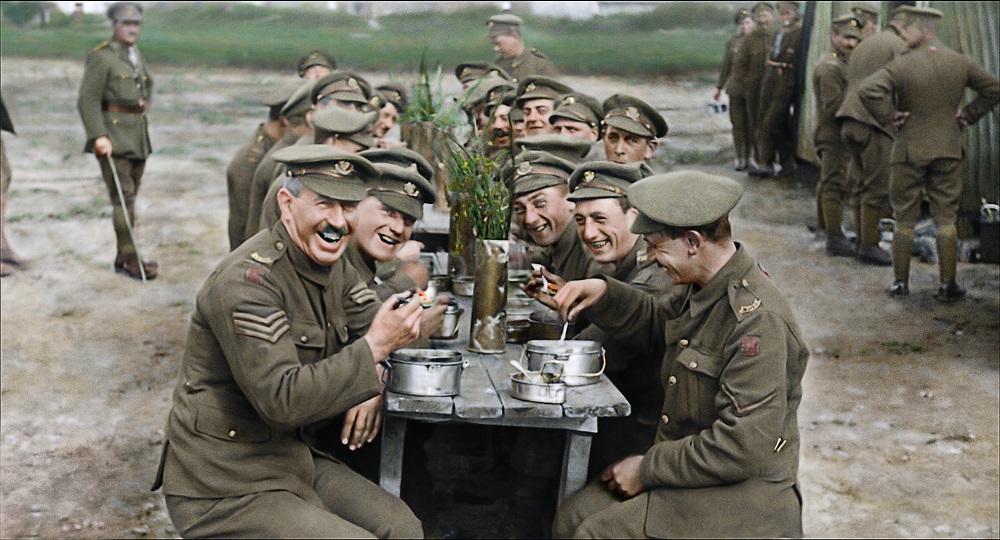
A powerful, harrowing portrait of World War I and its impact on the lives of those men who fought in the war, They Shall Not Grow Old employs the wonders of technology to tell a story most striking in its intimacy. Director Peter Jackson (Lord of the Rings) reviewed 600 hours of interviews with British veterans, made by the BBC and Imperial War Museum after the war, and the resulting documentary relies almost entirely on the men’s voices, recounting their experiences. Although the film follows a certain chronology, the perspective is always personal. In a feat of editing, the many voices take the viewer through the start of the war – ”Serbia when that chap was shot, it was that Serbian business wasn’t it?” – the call to enlist, training, the movement out to the front, the battlefields, the trenches, and finally, the war’s end and their return home.
Watching They Shall Not Grow Old is an immersive experience. The soundtrack alone would make this film a moving, captivating documentary, yet its impact is magnified by Jackson’s work with the visual aspect of the film. 100 hours of archival footage filmed during the war was meticulously restored and colorized, giving the film a feeling of immediacy. There is no attempt to deliver a particular message or agenda, no distractions in the form of names, dates, or other external markers. The testimonies of 120 men were selected and these form the majority of the soundtrack, a story collectively told. In the scenes filmed in the trenches and on the battlefield, the soundtrack has been augmented with the sounds that would have been heard there. Rifle shots ringing out, mines exploding, boots marching and the indistinct voices of the soldiers being filmed enhance the visceral quality of the film. In some cases, lip readers were able to decipher the words being said, and these snatches of comprehensible conversation, while not significant on their own, contribute to the overwhelming sense that one is there, with these men.
Many of them, as it turns out, were not yet men. They were youths of 18, 17, and sometimes just 16 or 15 years old when they enlisted. Although officially the call to enlist was for men ages 19 – 35, the testimony reveals that many recruitment offices were willing to bend the rules. As young, callow faces look back from the screen, different voices tell stories similar to that of the 15-year-old who was told to “go outside and come back and say you’re 18.” Some aspects of the experience are amusing and will be familiar to anyone who has been in the military, such as the difficulty of acquiring appropriate equipment and the banality of the food, with the guiding principle that one must make do. As the quartermaster told one soldier: “it’s your feet that don’t fit the boots.” Yet another wardrobe-challenged soldier was “issued a kilt but nothing to wear underneath it.” The cuisine was characterized by bully beef and vast quantities of plum and apple jam. Some young men focused on the educational aspect of training: “You learn to look after yourself whereas in civilian life your mother did all the chores.”
Yet when the soldiers go out to the front, they and the viewer are confronted with the bone-chilling reality of war. Images of bombed out towns onscreen are accompanied by the thoughts and emotions of those who were there: “The devastation was something I never could have imagined.” It is at this point that archival images and newsreels give way to footage filmed at the front, and the film makes its transition from black and white to color. The shift is unsettling, as if the soldiers and the war, seen until that moment in the familiar framework of history, suddenly come to life.
The horror of trench war and the battlefield come to vivid life. The images here are very harsh, stark and painful in their unrelenting honesty. As one soldier said: “The inferno was so blasting you had no time to think;” and the inevitable outcome is expressed by another: “The veneer of civilization was dropped away.” Yet relying so closely on one another – “You knew your lives were in one another’s hands” – the war was also a situation in which, as another soldier said, “There was a terrific lot of kindness.”
Those who survived the war remained forever changed by its brutality. Peter Jackson dedicated the film to his grandfather who served in the war, an indication that this was also a personal project for the filmmaker. The film’s title They Shall Not Grow Old, is taken from a line in Laurence Binyon’s poem For the Fallen: “They shall not grow old, as we that are left grow old.” We that are left, we that are alive now in this century, were not there, yet with this film we come as close as possible to experiencing the ravages of that war.
They Shall Not Grow Old
United Kingdom/New Zealand 2018, 109 min, English, Hebrew subtitles
Screening times:
Monday, May 27 at 17:00, cinematheque 3
Saturday, June 1 at 14:15, cinematheque 3
Tickets may be ordered online from the Docaviv website
Director: Peter Jackson; Production: Peter Jackson, Clare Olssen; Production Company: Wingut Films Limited, House Productions, Imperial War Museum; Editing: Jabez Olssen; Soundtrack: David Donaldson, Steve Roche, Janet Roddick; Music: John Neill





